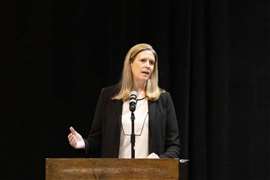Web exclusive: Metso helps meet Brazilian market demands
25 June 2009

Grupo Estrutural's Pedreiras Basalto 9 quarry close to São Paulo, Brazil has supplied many of the country's most important bridges, buildings and roads with concrete, aggregates and asphalt since it first started operating in 1962. Richard High reports.
Showing KHL.com around Pedreiras Basalto 9, quarry director Ednilson Artioli, who joined the company in 1993, was justifyibly pround of the iconic projects the company had contributed to over the last few years.
These include test tracks for General Motors, Firestone, Goodyear, VW and Toyota, and the under construction US$ 3.6 billion, 170 km-long Rodoanel Mario Covas (Greater São Paulo Beltway), plus the city's newest bridge, the Octavio Frias de Oliveira Bridge, which was named after the owner of the Folha de São Paulo newspaper and is known locally as Ponte Estaiada, which is Portuguese for Suspended Bridge.
The Pedreiras Basalto quarry is located close to several major cities besides São Paulo and its major clients include ready-mix companies, road contractors and local governments, said Mr Artioli. This proximity to several large cities (São Paulo has a population of 20 million), means transport costs for its customers can be kept to a minimum.
"Transport costs are usually a large part of any project, so the quarry's location played a large part in our decision to buy it in 1996," added Mr Artioli.
Situated close to several residential and commercial areas the quarry covers 24 ha and has reserves of 15 million m3, giving it an operational life of 15 to 20 years. It employs 100 people and blasts twice a month, with each blast on the 18 m-high, 8 m-deep benches producing 40000 m3 of diabase rock (the transition phase between granite and basalt) for crushing.
Current production levels average 150000 tonnes per month, said Mr Artioli, with 20>10, 10>5 and -5 being the main products. The most important of these is the -5, which is used in the company's on-site asphalt plant. The quarry also produces 4000 m3 of concrete a month from its own on-site plant.
The aggregate, asphalt and concrete produced is split between Grupo Estrutural's in-house contractor and outside contractors on a rough 50:50 basis.
Service and maintenance
Estrutural bought the quarry in 1996 and Metso have supplied it with crushing and screening equipment since. However, the relationship between the two companies goes back to 1972 when Estrutural's owner started to buy crushers and screens from the company that is now Metso Brasil Industria e Comercio.
Blasted rock is carried along the 0.75 km-long haul road by one of the company's 42.5 tonne capacity Randon RK425 rigid haulers to the crushing plant, which consists of a Faco 120 x 90 and Jaw Master 1312 primary crushers. From there the rock is carried to the secondary crusher, a Metso HP 400 cone crusher.
Tertiary crushing is done by a Metso HP 500 cone crusher, while quaternary crushing is done with a VSI 500 HP. There are seven screens, a mixture of double and triple decks, ranging from 4 x 1.5 m to 3 x 6 m.
"We use the two cone crushers to get the right shape, because even though the rock is quite hard it can be quite flaky," said Mr Artioli. "We conducted comparative studies with other crushers and knew that the Metso crushers would give us the most consistent results."
"In the last 10 years we've only bought new equipment and because our relationship with Metso is a transparent one we know the machines have low maintenance costs and the after sales service is exactly what we need.
"But to be honest there's very little maintenance needed, most problems are small - broken bolts for example - and can be fixed quickly by our own maintenance department or we can call the Metso engineers and they can usually fix things over the telephone," add Mr Artioli.
Business drivers
At the time of KHL.com's visit the crushing plant was working an average of 10 hours a day. "But there are lots of roads being built nearby and that can increase to 16," said Mr Artioli.
While the current financial crisis has had some effect on work in the region, Mr Artioli told KHL.com that the state government needs to construct roads while the federal government is also keen to build low cost housing for the regions poor.
Besides which, said Mr Artioli, the government´s Growth Acceleration Program (PAC), which will see it invest US$ 550 billion in infrastructure between now and 2014, its commitment to construct the Mercosul trade corridors that run through the country, and preparations for the 2014 FIFA World Cup, were also helping drive demand for the company's products.
"There are also the presidential elections in October 2010," added Mr Artioli. "The current governor of Sao Paulo, José Serra, wants to be the next president so the state government is currently spending BRL 2 billion (US$ 1.03 billion) on roads in the next two years, which is good news for us."






